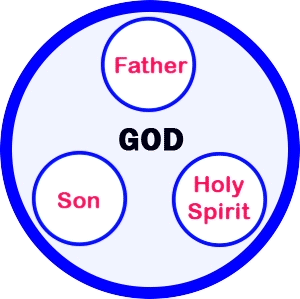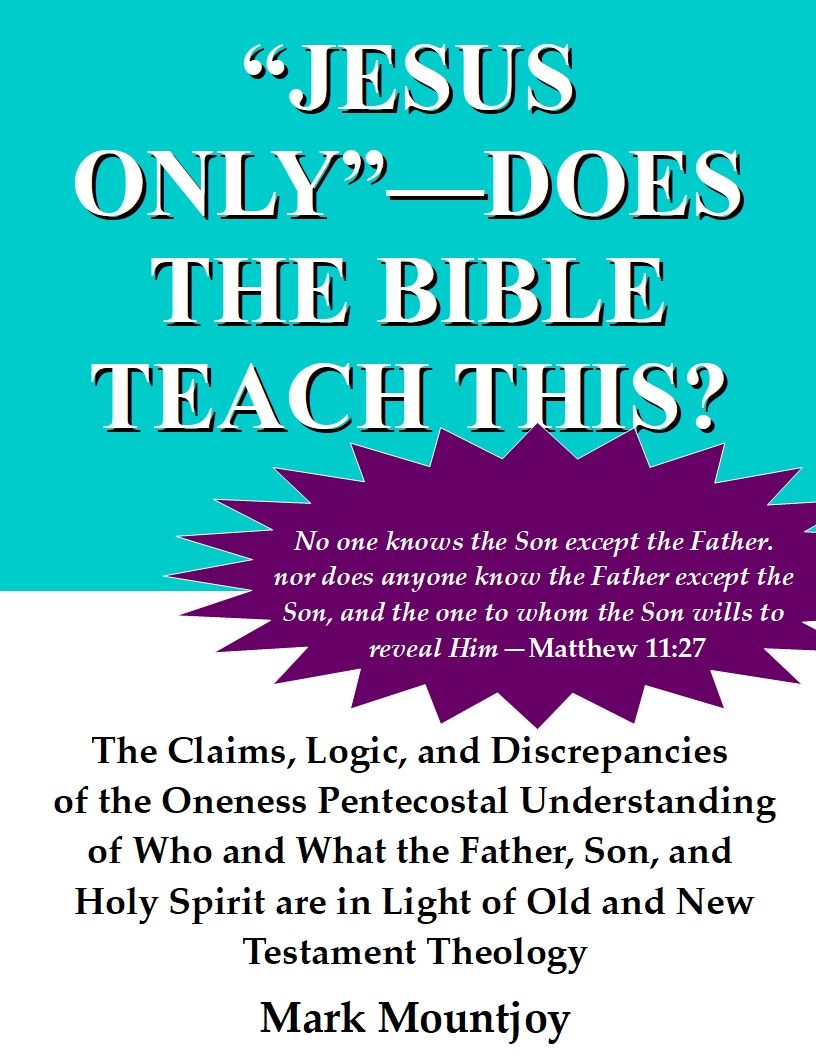
The New Independent Fundamentalist
Baptist Church is Being Accused of Heresy:
Here We Weigh in On This Issue
by Mark Mountjoy
Preamble:
The nature of God has been a topic of intense contemplation and debate throughout the history of Christianity. At the heart of this discussion lies the doctrine of the Trinity, a profound mystery that has captivated the minds of believers for centuries. As we delve into the pages of Scripture, we discover a God who is both beautifully complex and perfectly unified—a God who reveals Himself as three distinct Persons, yet remains one in essence. In this essay, we will embark on a journey through the New Testament to explore the evidence that points to the distinct personhood and unity of the Father, Son, and Holy Spirit, and consider how this understanding challenges the popular but misguided view of Modalism.
THE DOCTRINE OF THE TRINITY, which asserts that the God of Israel is one in essence but three in persons (the Father, the Son, and the Holy Spirit), is a central tenet of Christian faith. While the concept is complex and has been the subject of theological debate for centuries, it is essential to carefully examine the biblical evidence that illuminates the relationships and attributes of each Person of the Godhead.
One of the most compelling arguments against Modalism, the heretical view that the Father, Son, and Holy Spirit are merely different modes or manifestations of a single divine being, is found in 1 Corinthians 15:27-28, where Paul writes,
"For he hath put all things under his feet. But when he saith all things are put under him, it is manifest that he is excepted, which did put all things under him. And when all things shall be subdued unto him, then shall the Son also himself be subject unto him that put all things under him, that God may be all in all."
This statement poses a significant challenge to Modalism, as it would be illogical for the Son to be subject to Himself if He were merely a different mode or manifestation of the Father. Similarly, in Philippians 2:6-8, Paul describes Christ's mindset when He took on human flesh:
"Who, being in the form of God, thought it not robbery to be equal with God: But made himself of no reputation, and took upon him the form of a servant, and was made in the likeness of men: And being found in fashion as a man, he humbled himself, and became obedient unto death, even the death of the cross."
This passage implies that the Son had His own thoughts and choices regarding His incarnation and sacrifice, distinct from yet in perfect harmony with the Father's will. The interactions and conversations between the Persons of the Godhead further reinforce the idea of distinct personhood within the Trinity. In Hebrews 10:5-7, the writer quotes from Psalm 40:6-8:
"Wherefore when he cometh into the world, he saith, Sacrifice and offering thou wouldest not, but a body hast thou prepared me: In burnt offerings and sacrifices for sin thou hast had no pleasure. Then said I, Lo, I come (in the volume of the book it is written of me,) to do thy will, O God."
This dialogue portrays Christ as having a conversation with the Father, expressing His willingness to do the Father's will by taking on a human body and offering Himself as the ultimate sacrifice for sin. Likewise, in John 17:21, Jesus prays,
"That they all may be one; as thou, Father, art in me,
and I in thee, that they also may be one in us,"
demonstrating the distinct personhood and unity of the Father and the Son. The unique roles and authority within the Godhead also support the idea of distinct personhood. In Matthew 20:23, Jesus tells His disciples,
"But to sit on my right hand, and on my left, is not mine to give, but it shall be given to them for whom it is prepared of my Father,"
be given to them for whom it is prepared of my Father,"
indicating that the Father has prepared places of honor in the kingdom, not the Son. Similarly, in Revelation 1:1, we read,
"The Revelation of Jesus Christ, which God gave unto him, to shew unto his servants things which must shortly come to pass,"
showing that the Father "gave" Jesus the knowledge of the time of His return, emphasizing their distinct functions and responsibilities.
Finally, the limitations in knowledge and will between the Persons of the Trinity demonstrate that the Father, Son, and Holy Spirit do not share a single mind. In Matthew 24:36, Jesus states,
"But of that day and hour knoweth no man, no, not the angels of heaven, but my Father only,"
and in Mark 13:32, He adds,
"neither the Son."
These examples show that there are things known by the Father that are not known by the Son, challenging the notion of a single divine mind. In light of this compelling biblical evidence, it is crucial that Christians take on the task of personally reviewing, exploring, and studying this important issue. We must not simply accept popular views like Modalism without carefully examining the scriptural evidence that points to the distinct personhood and unity of the Trinity. As Paul exhorts in 2 Timothy 2:15,
"Study to shew thyself approved unto God, a workman that needeth not to be ashamed, rightly dividing the word of truth."
As you embark on this journey of discovery, approach the Scriptures with an open heart and a willingness to learn. Seek the guidance of the Holy Spirit, as Jesus promised in John 16:13,
"Howbeit when he, the Spirit of truth, is come,
he will guide you into all truth."
Be prepared to challenge your preconceived notions if they do not align with the biblical evidence, remembering Paul's admonition in 1 Thessalonians 5:21,
"Prove all things; hold fast that which is good."
In conclusion, the doctrine of the Trinity is a profound mystery that human minds cannot fully comprehend. However, the Bible provides ample evidence that each Person of the Godhead has His own mind and will, while remaining perfectly united in essence and purpose. As Christians, we must embrace this biblical understanding of the Trinity, marveling at the beautiful diversity and unity within the Godhead and seeking to reflect that unity in our own lives and relationships. Let us heed the words of Ephesians 4:3, endeavoring to keep "the unity of the Spirit in the bond of peace," as we commit ourselves to the lifelong pursuit of knowing and loving the Father, Son, and Holy Spirit more deeply, and to sharing this glorious truth with the world around us.
Postscript:
As we conclude our exploration of the biblical evidence for the distinct personhood and unity of the Trinity, it is essential to acknowledge the great power and majesty of the Son and the Holy Spirit. In John 1:3, we learn that
"all things were made by him [the Word, Jesus Christ]; and without him was not any thing made that was made."
Furthermore, Jesus declares in John 5:22-24 that
"the Father judgeth no man, but hath committed all judgment unto the Son: That all men should honour the Son, even as they honour the Father. He that honoureth not the Son honoureth not the Father which hath sent him. Verily, verily, I say unto you, He that heareth my word, and believeth on him that sent me, hath everlasting life, and shall not come into condemnation; but is passed from death unto life."
The apostle Paul also testifies to Christ's supreme authority in Colossians 1:15-17, describing Him as
"the image of the invisible God, the firstborn of every creature: For by him were all things created, that are in heaven, and that are in earth, visible and invisible, whether they be thrones, or dominions, or principalities, or powers: all things were created by him, and for him: And he is before all things, and by him all things consist."
The writer of Hebrews echoes this truth in Hebrews 1:8-12, quoting from the Psalms to affirm the Son's eternal nature and sovereign rule. Likewise, the Holy Spirit is not to be trifled with, as Jesus solemnly warns in Mark 3:28-30:
"Verily I say unto you, All sins shall be forgiven unto the sons of men, and blasphemies wherewith soever they shall blaspheme: But he that shall blaspheme against the Holy Ghost hath never forgiveness, but is in danger of eternal damnation: Because they said, He hath an unclean spirit."
The grave consequences of lying to the Holy Spirit are also demonstrated in Acts 5:1-11, where Ananias and Sapphira face divine judgment for their deception.
As we reflect on the glory and power of the triune God revealed in Scripture, let us approach Him with reverence and awe. We must resist the temptation to simplify or distort His nature, whether by reducing Him to mere modes or by dividing Him into separate deities. Instead, let us embrace the beautiful mystery of the Trinity, acknowledging the distinct personhood and perfect unity of the Father, Son, and Holy Spirit. May we worship and serve this holy God with all our heart, soul, mind, and strength, marveling at His incomprehensible greatness and boundless love for us.
Related
Jesus’ Divinity and Monotheism in the New Testament
A Look at the Error of Socinian
The New Testament Theology of the Father and the Son
[Click the image]

